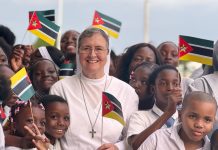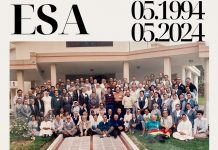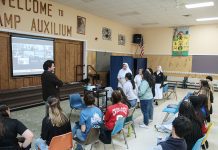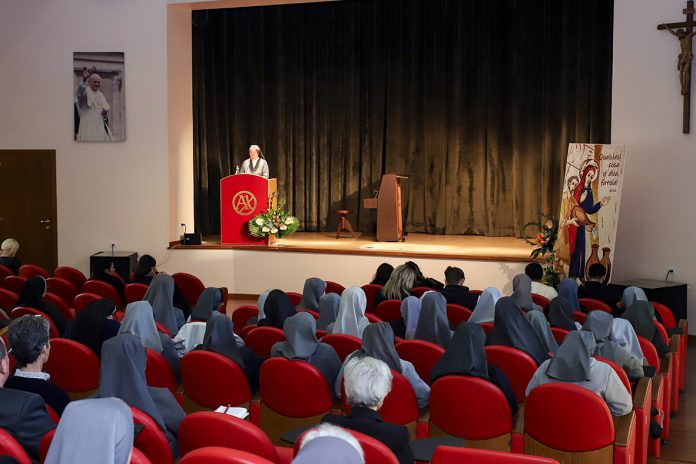Rome (Italy). On 14 November 2023 in Rome, in the John Paul II Aula Magna of the Pontifical Faculty of Educational Sciences ‘Auxilium’ – in the presence of students, Professors, of the Grand Chancellor Mother Chiara Cazzuola, Superior General of the Institute of the Daughters of Mary Help of Christians, Rectors of the Pontifical Universities, the Director of the Higher Institute of Educational and Training Sciences “Giuseppe Toniolo” of Modena, religious and civil authorities – the Academic Year 2023/2024 was officially inaugurated.
The act of academic inauguration began with the Eucharistic Celebration presided over by Cardinal Josè Tolentino de Mendonça, Prefect of the Dicastery for Culture and Education who in his homily, underlined how a school is not a place where technical information prevails. Rather, it is an educational project “as a response to the human vocation, as a call to self-discovery, to succeed in truly building a unity,” understood with Pope Francis as a complementarity ‘of head, heart, and hands’, a sort of dance of all human dimensions, which act as the choreography of life.”
He continued by expressing the belief that “a school has a great impact on each of us if it awakens our thirst; if it helps us, not to find quick answers, but to understand how important the questions are; if it helps us to open our hearts in a dimension that goes far beyond the immediate agenda.”
Through the metaphor of cooking and food, which affects the senses and emotions, Cardinal Tolentino de Mendonça then spoke about teaching, about education as “the art of awakening desire”. And he asked those present this question: “At the beginning of this academic year, what is my thirst, what am I thirsty for? And to what extent is being here at the Auxilium expanding my thirst, my ability to be a thirsty person?”
Taking up Saint Paul in his letter to the Romans, he defined the University as “a birthing room”, where everyone is committed to collaborating in mutual gestation. Every university journey is a sort of birth, an adventure, a heritage of generativity, of a profound encounter with one’s humanity, of the work of the Spirit. Because “education transforms; it makes us gain wings; it gives us perspectives; it makes us say ‘I am’. If there is a science in which we can place our hope, it is educational science.”
In her address on the theme “Educational poverty in today’s socio-economic context: the role of the University”, her last speech as Undersecretary of the Dicastery for Culture and Education, Prof. Antonella Sciarrone Alibrandi, newly appointed Judge of the Constitutional Court, recalled the paradigm changes proposed by Pope Francis. She referred to that of the economy (“The Economy of Francis”), of social relations (“Fratelli tutti”), of the relationship between humans and creation (“Laudato si” and Laudate Deum”), and educational methods (Global Pact for Education) in which “Everything is connected” in a basic harmony.
Highlighting a growth in situations of educational poverty, according to complex and varied forms, she highlighted “an education crisis linked to a deeper crisis of confidence in life, which affects everyone”. It is where “the educational relationship is the most precious tool also for reaching those paradigms of which Pope Francis speaks,” Prof. Sciarrone Alibrandi concluded by expressing the belief that “if you really want to change this world, the safest path, although it requires more patience, is solely education.”
“Pilgrims in search of the truth” is the title chosen by the Dean of the Faculty, Sister Piera Ruffinatto, for the Report on the Academic Year 2022-23, inspired by the words addressed on 3 August by Pope Francis to the young university students of the Universidade Católica Portuguesa of Lisbon. Pope Francis affirms that “in the ‘pilgrim’ the human condition is reflected, which is faced with great questions whose answers cannot be found in a simplistic or immediate way. On the contrary, they require you to make a journey by overcoming yourself and going beyond.”
With the awareness that “In this historical moment the challenges are enormous and the groans painful” and that “We can feel overwhelmed by the risk of thinking that the world is in agony,” the Principal urges us to listen to Pope Francis who reassures us. “We are birthing a new humanity of which young people are the protagonists if they are capable of taking on the responsibility of redefining progress in a process capable of uniting, rather than polarizing” and of accepting the invitation “to raise our gaze and cast it in depth.”
The Dean concluded by hoping that the academic community, “so varied in vocations and backgrounds” through its educational mandate will continue to commit “to building together a more just, more inclusive, that is, more advanced society,” with the feminine sensitivity the characterizes it.
In turn recalling “the drama of the historical horizon in which we are living” and the commitment “to give solid hope to young people hungry for a future and certainties,” in her greeting Mother Chiara Cazzuola underlined the importance of the culture of meeting, “indispensable to the culture of peace” and to form to peace. “Today we need prophets and makers of peace. Universities like ours must continue in their commitment to form educators and spreaders of a mentality of peace; I dare say of a ‘spirituality of peace.’ Peace is the fruit of the Spirit.”
Concluding, she recalled the 146 years since the first missionary expedition to Uruguay of the FMA Institute, which took place on 14 November 1877, made up of very young Sisters, thanks to their “audacity and courage we are here today from all parts of the world and in all parts of the world” and wishes all to have like them, “a great and missionary heart that does not run aground in the face of the difficulties of our time, but that continues to trust in the grace of God and the protection of Mary Help of Christians.”
The last act of the morning was the proclamation of Prof. Giuseppina Del Core, FMA, Professor emerita of Orientation Psychology and former Rector of the Pontifical Faculty «Auxilium» from 2010 to 2019. Sister Pina expressed her gratitude for the grace of over thirty years of work at the Auxilium in various roles, to meet and accompany a large number of young people and to come into contact with many personalities from academic institutions and the Church.
The morning was enriched by the musical interlude held by Soprano Dominika Zamara who, accompanied on the piano by Maestro Marco Lo Muscio, performed three pieces by Schubert, Mozart, and Francesco Paolo Tosti.
Photos: Flickr FMA





















auguri in quest’anno pieno di belle esperienze